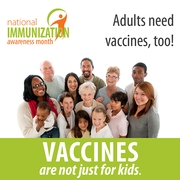Information you need to live a happy, worry-free retirement!
Medicare & Vaccines: Know Your Coverage

While most Americans over age 65 get an annual flu shot, they’ve been slow to take advantage of the shingles vaccination. And those aren’t the only vaccinations older Americans should get.
August is National Immunization Awareness Month. Do you know which vaccines are recommended for adults over age 60, and are you up-to-date on those shots? Do you know which ones are covered by Medicare?
The Importance of Vaccines as We Age
Our immune systems tend to weaken as we age, making us more susceptible to certain diseases. And protection from some childhood vaccines can wear off over time. While some adults with specific health conditions should not get certain vaccines, the Centers for Disease Control and Prevention (CDC) recommends that all adults 60 years or older need:
- A seasonal flu (influenza) vaccine every year
- The Tdap vaccine to protect against pertussis (whooping cough) once if they did not receive it as an adolescent
- A Td (tetanus, diphtheria) booster shot every 10 years
- Pneumococcal vaccines to protect against infections that can lead to pneumonia and meningitis
- The Zoster vaccine, which protects against shingles
Need convincing? The CDC estimates that 1 million Americans every year get the shingles, a painful rash that forms blisters and can cause fever and headache, and about half of those inflicted are 60 years old or older. It results from the same virus that causes chickenpox, and the lifetime risk of shingles is one in three, rising to one in two for 85-year-olds and older.
More than 60% of seasonal flu-related hospitalizations occur in people 65 years and older, and the great majority of those who die from it are 65 or older, too. The proportion of adults 65 years old and older who received the flu vaccination in the 2016-2017 flu season dropped 3.3% compared to the prior year’s season, according to the CDC.
How Medicare Vaccination Coverage Works
Medicare covers some vaccines and immunizations. How it covers them varies — it depends on what you need.
Medicare Part B (medical insurance) covers vaccines to prevent influenza, pneumonia and hepatitis B (if you’re at medium to high risk). Medicare Part D (prescription drug insurance) covers all vaccines other than the flu, pneumonia or hepatitis B vaccines. (Part B will cover rabies and tetanus immunizations only if you’ve been exposed to a dangerous disease or virus.)
The Medicare.gov website urges you to ask your doctor questions because he or she may recommend that you get vaccination services more often than Medicare covers or services not covered by Medicare. In those cases, you may have to pay some or all of the costs.
Discuss these vaccinations with your health care provider to ensure that you are protecting yourself.
Flu shots
- If you have Original Medicare, you pay nothing for an annual flu shot if the doctor or other qualified health care provider accepts assignment for giving the shot.
Shingles shot
- The shingles shot isn’t covered by Medicare Part A (hospital insurance) or Medicare Part B (medical insurance).
- Generally, Medicare prescription drug plans (Part D) cover all commercially-available vaccines (like the shingles shot) needed to prevent illness. Contact your Medicare drug plan for more information about coverage.
Pneumococcal shots
- Medicare Part B (medical insurance) covers a pneumococcal shot to prevent pneumococcal infections (like certain types of pneumonia). Part B also covers a different second shot one year later. (Medicare now recommends an initial pneumonia vaccine using a 27-valent vaccine — Pneumovax — and the second vaccine 12 months later using the 13-valent vaccine —Prevnar-13.) Talk with your doctor or other health care provider to see if you need these shots.
- All people with Part B are covered.
- If you have Original Medicare, you pay nothing for pneumococcal shots if your doctor or other qualified health care provider accepts assignment.
Tdap shot (tetanus, diphtheria, & pertussis shot)
- Tdap is the adolescent and adult booster shot for tetanus, diphtheria, and pertussis (also called whooping cough). The childhood shot is called DTaP. Both protect against tetanus, diphtheria and pertussis.
- Generally, Medicare prescription drug coverage (Part D) covers all commercially available shots needed to prevent illness. Contact your Medicare drug plan for more information about coverage.
Hepatitis B shots
- Medicare Part B (medical insurance) covers Hepatitis B shots.
- If you have Original Medicare, you pay nothing for the shot if the doctor or other qualified health care provider accepts assignment.
The CDC offers an online quiz that recommends vaccines you may need based on your answers. Take the quiz and discuss the list with your doctor or health care professional.
If you have questions on your Medicare plan’s coverage of vaccinations, call Medicare MarketPlace® at 1-800-639-0781 to speak to a Licensed Insurance Agent.



